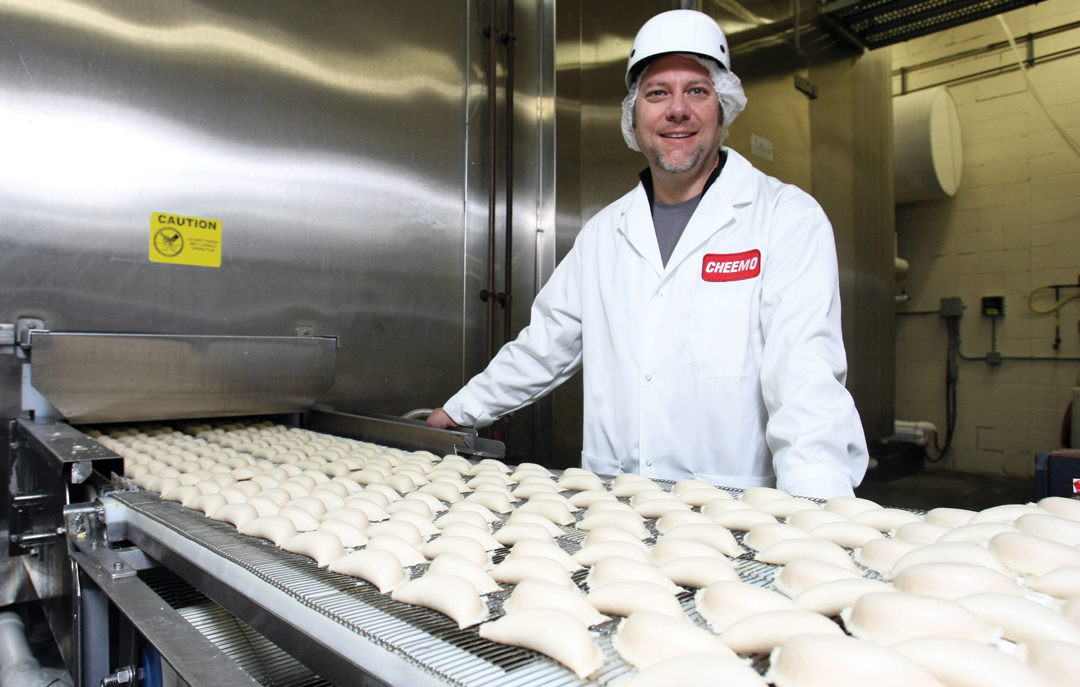PEROGY PROGRESS
EDMONTON FOOD COMPANY BUILDS DUMPLING EMPIRE WITH ALBERTA INGREDIENTS
BY IAN DOIG • PHOTO COURTESY OF HERITAGE FROZEN FOODS
Take one guess how many perogies are produced daily by Edmonton’s Heritage Frozen Foods, makers of Cheemo Perogies? Chances are, you’ve exponentially lowballed the number.
Heritage purchases about nine million kilograms of Alberta Hard Red Spring Wheat flour a year from ADM Milling Co. of Calgary. This flour is used to produce three million perogies a day for a total of 750 million per year. That’s enough to fill 1,200 semitrailers.
“Perogies are really a Canadian phenomenon,” said Joe Makowecki, Heritage president and CEO. This family business has greatly contributed to the adoption of this cornerstone of Ukrainian cuisine as a national staple. The business does slightly more than $30 million in annual sales and employs 100-plus full-time staff.
Makowecki’s late father Walter sold his Vegreville-area farm, launching the company in 1972, with the ambition to transform agricultural commodities into value-added foodstuffs. Given the family’s Ukrainian heritage, tasty, nutritious and inexpensive perogies were a natural choice. Canadians of many ethnic backgrounds took to them in part because they resembled dumplings such as won tons and tortellini. Sales escalated in the 1970s as women entered the workforce in greater number. Quick and convenient to cook, the appeal of perogies to time-starved families has kept them relatively immune to shifting food trends.
Makowecki said his father recognized the lifestyle fit for perogies but also the competitive necessity of producing them efficiently at high volume. As such, the company’s production system is highly automated. Competing with frozen foods such as french fries and pizza also necessitates constant product development. Responding to ethnic and generational preferences has produced variations such as curry and pizza perogies. “There’s always new stuff going into the freezer section in order to drive interest in our area,” said Makowecki.
Using local flour, potatoes and canola oil makes sense for this growing perogy powerhouse, which also uses dairy products primarily produced in Eastern Canada. The quality and consistency of Alberta wheat and potatoes are “second to none in the world,” said Makowecki, and having suppliers nearby minimizes inbound transport cost.
These factors offset the expense and logistical challenges of transporting products across North America. “Because of distance, a lot of our inventory is in transit, so we have to be mindful that all the other competitive factors—ingredients, labour, overhead, utilities—must offset that,” said Makowecki.
“That’s an Achilles heel for Canada’s transportation systems, which are stretched on road and rail,” he said. “It will be a long-term limitation, even for us.” He described rail transport as the most efficient means to move product, but competition with oil and grain (ironically) for freight allocation is a limitation. Additionally, he said a shortage of truck drivers in Canada and the U.S. hinders transport.
Impediments aside, sales in Canada and the United States have grown rapidly over the last two years. A planned entry into the Mexican market is on hold while a facility expansion is underway.
In the U.S., competition in the food market is fierce and perogies are not well-known outside communities with Eastern-European ancestry. But, Cheemo Perogies are available at U.S. grocers and Heritage supplies house-brand versions to bars, restaurants, hospitals and seniors centres. They’re also peddled by the National Football League’s Pittsburgh Steelers at two Heinz Field perogy houses.
Alberta ingredients will remain part of the growth recipe for Heritage Frozen Foods said Makowecki, and he has advice for entrepreneurs hoping to build food businesses in the province. “Alberta is a fantastic place to live and grow a business, but you are competing with every other food product in the world. Always look to improve your operational costs.”







Comments